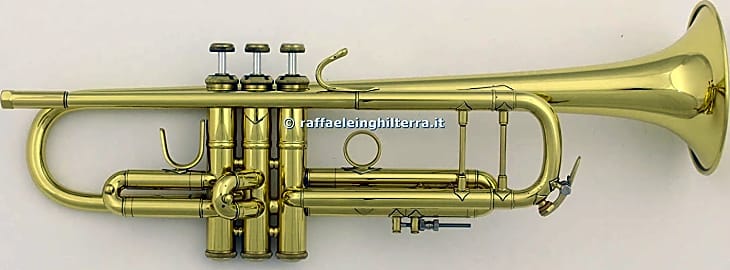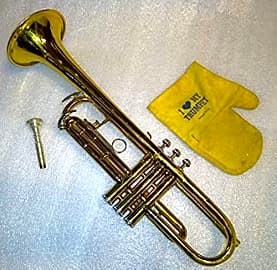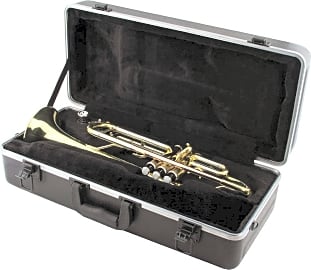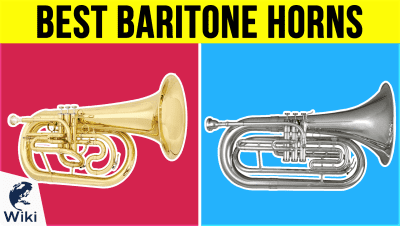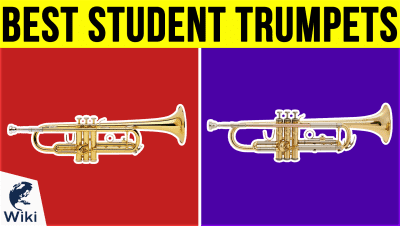The 10 Best Trumpets

This wiki has been updated 40 times since it was first published in September of 2015. Are you musically inspired by Louis Armstrong, Wynton Marsalis, Miles Davis, or Herb Alpert, and dream in B flat? No matter your preference or level of commitment, one of these trumpets will be just the instrument you need for sharing your talent with the world. You’ll find reliable models for everyone, whether beginner, intermediate, or professional, in a variety of finishes and price ranges. When users buy our independently chosen editorial choices, we may earn commissions to help fund the Wiki.
Editor's Notes
November 27, 2020:
We decided to stop recommending the Jean Paul TR-430, because there's just very little functional difference between it and its less expensive relative. The truth is, in the lower price range, there's not a ton of difference between models - at that stage, it really comes down to manufacturing quality and consistency.
With that in mind, the Jean Paul TR-330 and LJ Hutchen B-Flat are certainly passable instruments that many band leaders approve of, although the King 600 is the way to go if you insist on a more tried-and-true pedigree. Plus, it's practically bulletproof, so as long as you have a decent case, it will all but certainly last through high school.
Only slightly more expensive, but of significantly higher quality, is the Blessing 1460G. If you can find it at a reasonable price, you'll almost certainly be satisfied with it for learning on. Rounding out the student-level horns is the Yamaha YTR 2330. It's more often considered an intermediate horn, but the intermediate class is often misleading - this one, however, is well worth the moderate investment.
Then there are some really excellent pro models that are easy to get your hands on. The Bach Stradivarius 37 is, of course, a classic, but earlier this year I switched out my B&S Challenger II - which is highly similar to the Bach 37 - for a Bach Stradivarius 72, as I generally perform as a soloist, and I can attest that the 72 has an incredible amount of overhead. It's basically impossible to overblow, and if you practice enough, you'll build up some rock-solid chops in no time.
November 29, 2019:
I've been playing the trumpet for over 20 years, so I know a thing or two about selecting a horn. As with most instruments, it's generally harder to learn on a poor-quality one, but this difficulty isn't quite as pronounced as, say, a saxophone or baritone horn. So, if you're looking for a trumpet for a beginner, you can actually get by decently with the Jean Paul TR-330, Jean Paul TR-430, or LJ Hutchen B-Flat. They may not hold perfect pitches across the scale -- especially in the upper register -- but they are serviceable horns, and they make good options if they'll be used on the football field for marching band, because it's not the end of the world if they get a little banged up.
That said, it's impossible to make a 100% exhaustive list of good trumpets, but these are really some of the best you can find. If you want a great horn but don't want to spend a ton, it's hard to do better than the Yamaha YTR 2330. It costs right around a grand and many students will find it a pleasure to play on; the Getzen 590S and Getzen 900S Eterna are both a step up in terms of price, but they perform almost on the level of the high-end horns on our list.
The Bach Stradivarius is undoubtedly the most popular among Us students, and for good reason; it's a quite good trumpet. But some people (myself included) also feel that it's riding on its reputation a bit in the last couple decades, and you can arguably find a noticeably better horn in the same price range. If you like the bright, flexible, and bold tone of the Bach but want something that feels a bit more substantial, check out the B&S Challenger II. I've used a large-bore version of this one for about the last year, and I simply could not be happier. If you're into orchestral music, you may have seen the Yamaha Xeno around, as it's frequently used by trumpeters in classical settings. It's somewhat heavily slotted and not ideal for blues and jazz, but it's a phenomenal horn in its own right.
This brings us to the Schilke B Series. This horn is a dream to play. It's remarkably expensive, but it's still not the most expensive trumpet on the planet. It's free-blowing, loud, has a malleable tone, made with a one-piece bell, and an all-around top performer. It is also absolutely not for beginners.
Also keep in mind that a used horn can save you quite a bit of money, and in some cases,older models can actually be superior. Our Special honors section has two good options for these; Trumpet Herald is a large marketplace for sales by owners, although of course you might run into some issues with less-than-stellar instrument conditions. If you want to be certain that the used horn you're getting is in perfect shape, check out Phil Parker's selection. I had the pleasure of meeting Phil and his staff once when I visited London; in fact it's where I purchased my B&S. They keep their used horns fantastically maintained and are happy to ship your selection across the pond with insurance for a nominal fee.
Special Honors
Trumpet Herald If you're in the market for a secondhand instrument, you'll find a massive selection on this incredibly popular marketplace. There is, of course, a bit of uncertainty when buying a horn that you don't have a chance to play first, but if you know what you're looking for, this can be a great place to find it at a reasonable price. trumpetherald.com
Schilke Trumpets Schilke makes a wide selection of some of the finest horns on the planet, and because a professional trumpet is such a large investment, you'll want to make sure you get exactly the right one for you. If you want to investigate their high-end models in depth, you'll find a complete listing here, as well as locations of authorized sellers. schilkemusic.com
Phil Parker, Ltd. Phil Parker is one of, if not the top brass dealer in London. While you can always order a brand-new copy of your favorite horn from a number of sources, one of his strengths is his massive collection of used horns. If you're looking for a particular model of professional horn or if you're a collector of antique models, consult with him and he may have a special instrument just for you. philparker.biz
The Abridged History Of The Trumpet
With the addition of valves common by the middle of the 1800s, the instrument was soon to help revolutionize music in the 1900s.
The trumpet is a wind instrument in the brass family that is popular all around the world, and has been played for many centuries. While the modern trumpet usually consists of tubing bent twice into an oblong shape with an overall length of nearly five feet, traditional trumpets came in varied shapes and sizes.
Archeological evidence can trace trumpet production back some 3,500 years into ancient history, with instruments approximating a trumpet's design uncovered in Ancient Egypt, China, and other areas of central Asia. Biblical tales about trumpets being used to "blow down the walls of Jericho" are almost assuredly apocryphal, but they do confirm the existence of this wind instrument during that long ago era. In the early centuries of the Common Era, trumpets were produced and played in the Americas, with trumpet like instruments found in parts of Peru in particular.
Early trumpets were largely used for signaling purposes, conveying messages across distances or to be heard over the din of battle. They may also have been used in ceremonial or worship proceedings, but were likely not used in the sense with which we treat a musical instrument today. In fact, it was not until the turn of the last century that trumpets truly gained recognition as unique instruments worthy of being used at the center of musical compositions.
Long relegated to supporting roles by the major composers of the classical era, the 20th Century finally saw the trumpet getting its proper respect and enjoying an enlarged oeuvre of compositions. This rapid expansion of the repertoire produced for trumpet players was largely thanks to technological innovations that had seen the addition of valves to the trumpet.
Traditional trumpets had no way to modify pitch or tone other than by a player essentially blowing into the instrument with varied degrees of force. With the addition of valves common by the middle of the 1800s, the instrument was soon to help revolutionize music in the 1900s. Not only would the trumpet soon play a larger role in orchestral music, but it would take center stage in a brand new genre of music known as jazz.
The Trumpet Player
Trumpet Player is a poem written by Langston Hughes that both celebrates the man as musician yet laments the plight of largely dispossessed African Americans during the 20th Century. Indeed jazz music, that fiercely original American genre, was formed largely as a result of the separation between black communities of the south and the wider American public. A confluence of styles influenced early jazz, and these included Blues music, Ragtime, and European Quadrilles, to name a few. The genre developed in many areas, with New Orleans treated as the traditional cradle of jazz music. And at the center of many jazz bands was the trumpet player.
The genre developed in many areas, with New Orleans treated as the traditional cradle of jazz music.
Perhaps the most famous trumpeters of all time remain those men that helped define jazz in the first place; giants such as Louis Armstrong and Dizzy Gillespie were not only virtuosic trumpet players, but also helped to define the nascent sounds of the jazz genre, with playing styles featuring everything from syncopation to a heavy reliance on improvisation to that intangible but indefeasible quality known only as swing.
The trumpet also gained greater recognition and use in orchestras playing more classical styles of music. A comparison between the works of Mozart or Bach contacted with those of a famed 20th Century composer such as Aaron Copland make clear the new respect paid to the trumpet. Copland's beloved piece Fanfare for the Common Man, for example, was scored primarily for brass and percussion instruments, a marked departure from the former's role as a mere supporting player in other eras of orchestral music.
Choosing The Right Trumpet For You
Choosing a trumpet comes down to two primary factors: your experience level, and your budget. Looking at the latter factor first, one should keep in mind that while it's easy to spend many thousands on a superlative trumpet, it's also entirely possible to buy a decent instrument for considerably less. If budget is no concern, then by all means consider a high end, expensive trumpet. On the other side of the coin, be wary of ultra-cheap trumpets, as these are often derided as merely "trumpet-shaped objects" and, after a just a few uses, may freeze up and become unplayable.
The bore of a trumpet contributes quite a bit to its response, and also determines just how much endurance you'll need to play the horn effectively.
The general idea is that there are three levels of brass instruments: beginner or student, intermediate, and professional-level horns. In reality, however, there are student horns, professional horns, and everything in between, which is really a spectrum of quality. One thing you should be aware of, however, is that some horns marketed as "intermediate" are functionally identical to a "beginner" horn, but with a slightly better-looking finish, or marginally more attractive fittings, or something else similarly superficial.
So what sets a good horn apart from a poor-quality one? The easiest to tell from a player's perspective are valve tolerances and articulation response - both of these are very apparent, very quickly, at least to a trained performer. The bore of a trumpet contributes quite a bit to its response, and also determines just how much endurance you'll need to play the horn effectively.
A main difference between trumpets, of course, is simply the timbre, or sound quality of the individual instrument. Subtle features like lead-pipe style, brace configurations, one- or two-piece construction, bell alloy, and even valve keycap material all make a difference to the experienced musician.
Responsible ownership of a trumpet means being ready to spend some time on care and maintenance, and that starts with having a good case for the transport and storage of your instrument. If your trumpets does not come with a good bag, you should invest in one. You also need to make sure you have and use the right oil to keep it moving parts in good condition, and the right cleaner to keep it shined and tarnish free, but without risking any damage to the instrument's finish.




